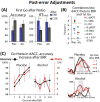Theta oscillatory dynamics of inhibitory control, error processing, and post-error adjustments: Neural underpinnings and alcohol-induced dysregulation in social drinkers
- PMID: 35567304
- PMCID: PMC9543652
- DOI: 10.1111/acer.14856
Theta oscillatory dynamics of inhibitory control, error processing, and post-error adjustments: Neural underpinnings and alcohol-induced dysregulation in social drinkers
Abstract
Background: Alcohol intoxication impairs inhibitory control, resulting in disinhibited, impulsive behavior. The anterior cingulate cortex (ACC) plays an essential role in a range of executive functions and is sensitive to the effects of alcohol, which contributes to the top-down cognitive dysregulation. This study used a multimodal approach to examine the acute effects of alcohol on the neural underpinnings of inhibitory control, inhibition failures, and neurobehavioral optimization as reflected in trial-to-trial dynamics of post-error adjustments.
Methods: Adult social drinkers served as their own controls by participating in the Go/NoGo task during acute alcohol and placebo conditions in a multi-session, counterbalanced design. Distributed source modeling of the magnetoencephalographic signal was combined with structural magnetic resonance imaging to characterize the spatio-temporal dynamics of inhibitory control in the time-frequency domain.
Results: Successful response inhibition (NoGo) elicited right-lateralized event-related theta power (4 to 7 Hz). Errors elicited a short-latency increase in theta power in the dorsal (dACC), followed by activity in the rostral (rACC), which may underlie an affective "oh, no!" orienting response to errors. Error-related theta in the dACC was associated with subsequent activity of the motor areas on the first post-error trial, suggesting the occurrence of post-error output adjustments. Importantly, a gradual increase of the dACC theta across post-error trials closely tracked improvements in accuracy under placebo, which may reflect cognitive control engagement to optimize response accuracy. In contrast, alcohol increased NoGo commission errors, dysregulated theta during correct NoGo withholding, and abolished the post-error theta enhancement of cognitive control.
Conclusions: Confirming the sensitivity of frontal theta to inhibitory control and error monitoring, the results support functional and temporal dissociation along the dorso-rostral axis of the ACC and the deleterious effects of alcohol on the frontal circuitry subserving top-down regulation. Over time, alcohol-induced disinhibition may give rise to compulsive drinking and contribute to alcohol misuse.
Keywords: alcohol intoxication; anterior cingulate cortex; errors; event-related theta; response inhibition.
© 2022 The Authors. Alcoholism: Clinical & Experimental Research published by Wiley Periodicals LLC on behalf of Research Society on Alcoholism.
Conflict of interest statement
The authors declare that there is no conflict of interest.
Figures





Similar articles
-
Theta oscillations are sensitive to both early and late conflict processing stages: effects of alcohol intoxication.PLoS One. 2012;7(8):e43957. doi: 10.1371/journal.pone.0043957. Epub 2012 Aug 27. PLoS One. 2012. PMID: 22952823 Free PMC article. Clinical Trial.
-
Alcohol Hits You When It Is Hard: Intoxication, Task Difficulty, and Theta Brain Oscillations.Alcohol Clin Exp Res. 2016 Apr;40(4):743-52. doi: 10.1111/acer.13014. Epub 2016 Mar 25. Alcohol Clin Exp Res. 2016. PMID: 27012442 Free PMC article.
-
Disruption of Frontal Lobe Neural Synchrony During Cognitive Control by Alcohol Intoxication.J Vis Exp. 2019 Feb 6;(144):10.3791/58839. doi: 10.3791/58839. J Vis Exp. 2019. PMID: 30799848 Free PMC article.
-
Meta-analysis of acute alcohol effects on response inhibition.Neurosci Biobehav Rev. 2023 Sep;152:105274. doi: 10.1016/j.neubiorev.2023.105274. Epub 2023 Jun 3. Neurosci Biobehav Rev. 2023. PMID: 37277010 Review.
-
Acute alcohol effects on inhibitory control and implicit cognition: implications for loss of control over drinking.Alcohol Clin Exp Res. 2010 Aug;34(8):1346-52. doi: 10.1111/j.1530-0277.2010.01218.x. Epub 2010 May 14. Alcohol Clin Exp Res. 2010. PMID: 20491732 Free PMC article. Review.
Cited by
-
Neural indices of heritable impulsivity: Impact of the COMT Val158Met polymorphism on frontal beta power during early motor preparation.Biol Psychol. 2024 Sep;191:108826. doi: 10.1016/j.biopsycho.2024.108826. Epub 2024 Jun 9. Biol Psychol. 2024. PMID: 38862067 Free PMC article.
-
Unveiling alcohol bias and impaired inhibitory control in young binge drinkers: insights from the alcohol hayling task.Sci Rep. 2025 Jul 16;15(1):25704. doi: 10.1038/s41598-025-10741-4. Sci Rep. 2025. PMID: 40670522 Free PMC article.
-
Modulating food craving-related neural oscillations using tACS: study protocol for a randomized sham-controlled trial.Front Hum Neurosci. 2025 Jul 30;19:1612062. doi: 10.3389/fnhum.2025.1612062. eCollection 2025. Front Hum Neurosci. 2025. PMID: 40808810 Free PMC article.
-
Impaired behavioral inhibitory control of self-injury cues between adolescents with depression with self-injury behavior and those without during a two-choice oddball task: an event-related potential study.Front Psychiatry. 2023 Jun 12;14:1165210. doi: 10.3389/fpsyt.2023.1165210. eCollection 2023. Front Psychiatry. 2023. PMID: 37377469 Free PMC article.
-
Updating the relationship of the Ne/ERN to task-related behavior: A brief review and suggestions for future research.Front Hum Neurosci. 2023 Apr 4;17:1150244. doi: 10.3389/fnhum.2023.1150244. eCollection 2023. Front Hum Neurosci. 2023. PMID: 37082151 Free PMC article. Review.
References
-
- Aron, A.R. , Robbins, T.W. & Poldrack, R.A. (2014) Inhibition and the right inferior frontal cortex: one decade on. Trends in Cognitive Sciences, 18, 177–185. - PubMed
-
- Bartholow, B.D. , Pearson, M. , Sher, K.J. , Wieman, L.C. , Fabiani, M. & Gratton, G. (2003) Effects of alcohol consumption and alcohol susceptibility on cognition: a psychophysiological examination. Biological Psychology, 64, 167–190. - PubMed
Publication types
MeSH terms
Substances
Grants and funding
LinkOut - more resources
Full Text Sources
Medical

